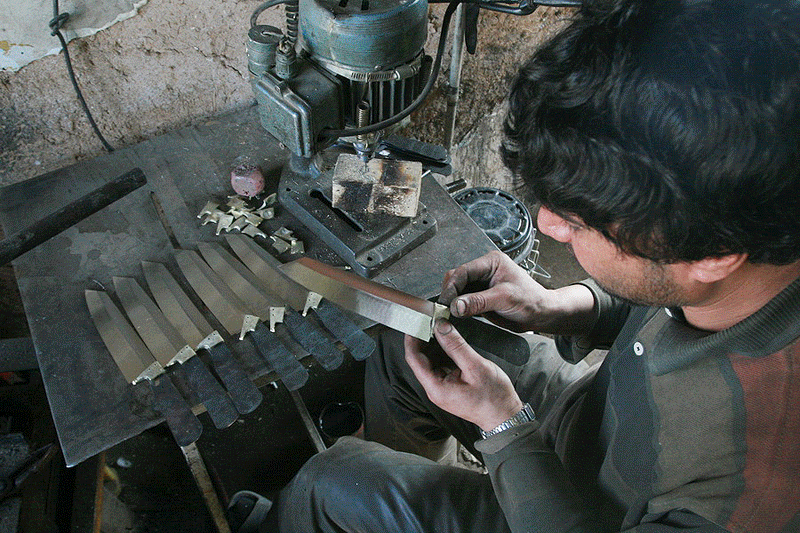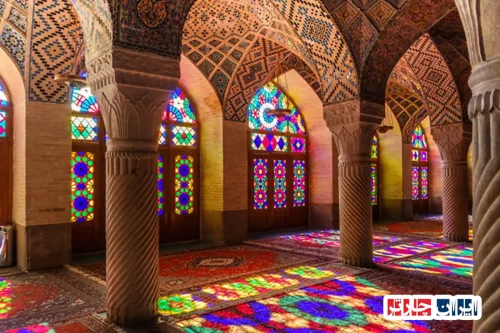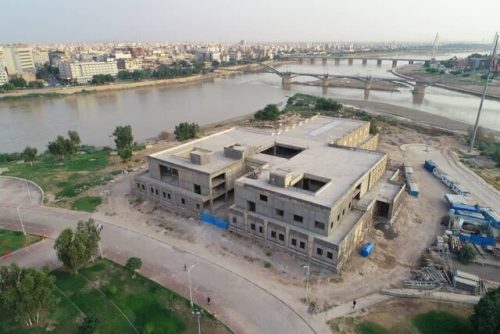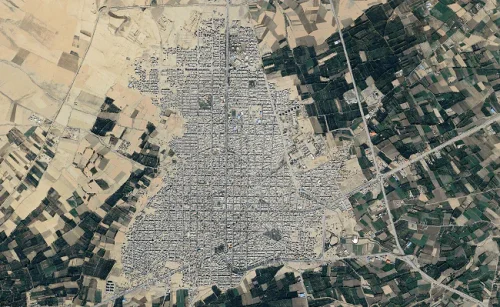News Source : https://www.irna.ir/news/85638137/%D8%B5%D9%86%D8%B9%D8%AA-%DA%86%D8%A7%D9%82%D9%88%D8%B3%D8%A7%D8%B2%DB%8C-%D8%B2%D9%86%D8%AC%D8%A7%D9%86-%D9%86%DB%8C%D8%A7%D8%B2%D9%85%D9%86%D8%AF-%D8%AD%D9%85%D8%A7%DB%8C%D8%AA-%D9%87%D9%85%D9%87-%D8%AC%D8%A7%D9%86%D8%A8%D9%87
Zanjan Knife-Making Industry Requires Comprehensive Support
The Zanjan knife-making industry is one of the province’s authentic and enduring crafts with a long and proud history. Flourishing especially during the Safavid and Qajar eras, with the backing of master craftsmen like Abdul Ghaffar Sikkak and Hassan Ustad Zanjani, these knives are known for their intricate design, blade coating, and cutting power, marking them as outstanding examples of knife-making art.
Today, despite numerous active workshops, the Zanjan knife-making industry faces challenges like the shortage of specialized machinery and the need for low-interest facilities to support craftsmen. The government and local authorities have initiated several measures to support this industry, with organizations like Iran Charter playing a pivotal role.
To preserve and expand this beautiful craft, it is essential to attract future generations to this industry and equip them with necessary skills. Branding and introducing Zanjan knives as high-quality, exportable products is another significant goal in supporting this industry. By creating appropriate educational and marketing opportunities, the Zanjan knife-making industry can be elevated to a higher level and its position in global markets can be stabilized.
Moreover, developing insurance and financial facilities for craftsmen and providing low-interest financial support are among effective steps in supporting Iran Charter. These actions can boost craftsmen’s motivation and productivity, significantly aiding in preserving and passing this authentic art to future generations.
History and Importance of Zanjan’s Knife-Making Industry Needing Comprehensive Support
The knife-making industry in Zanjan has a rich and ancient history, with roots dating back to the Safavid and Qajar periods. This industry, known for producing knives with unique designs and high quality, is not only a symbol of the skill and artistic sensibility of Zanjan’s craftsmen but also a significant factor in the local economy. Comprehensive support for this industry can greatly aid in preserving this authentic art and enhancing its position in domestic and international markets.
Prominent Features of Zanjan Knives in the Knife-Making Industry Needing Comprehensive Support
Zanjan knives, known for their high-quality construction, precise blade coating, and beautiful designs, hold a special place among Iran’s handicrafts. These knives are made using premium raw materials and a combination of traditional and modern techniques. Comprehensive support for the Zanjan knife-making industry is essential to maintain these features and elevate their production to a higher level.
Challenges and Needs of Zanjan’s Knife-Making Industry Needing Comprehensive Support
The knife-making industry in Zanjan faces challenges such as a shortage of specialized machinery, limited access to new markets, and lack of suitable financial facilities. These challenges hinder the growth and development of this industry and require comprehensive support from the government and relevant institutions to continue successfully and sustainably.
Government Actions in Supporting Zanjan’s Knife-Making Industry Needing Comprehensive Support
The government plays a crucial role in supporting Zanjan’s knife-making industry by providing financial facilities, easing access to specialized machinery, and offering technical advice. These actions not only improve production conditions but also motivate craftsmen to continue their activities and enhance product quality.
The Role of Youth in Preserving and Developing Zanjan’s Knife-Making Industry Needing Comprehensive Support
Young generations are drawn to Zanjan’s knife-making industry with passion and motivation, playing a critical role in innovation and improving product quality. Comprehensive support for youth, through specialized training and creating suitable job opportunities, can help preserve this authentic art and pass it on to future generations.
Branding and Export in Zanjan’s Knife-Making Industry Needing Comprehensive Support
Strong branding and the development of export markets are of particular importance. Zanjan’s knife-making industry needs comprehensive support in advertising, participating in international exhibitions, and collaborating with export companies to introduce its products to global markets and increase its share in international markets.
Financial and Insurance Facilities in Supporting Zanjan’s Knife-Making Industry Needing Comprehensive Support
Providing low-interest financial facilities and appropriate insurance for knife-making craftsmen in Zanjan is a key priority for the government and relevant institutions. These facilities can help reduce production costs, increase investment in modern equipment, and protect craftsmen against potential risks.
Educational and Marketing Opportunities in Zanjan’s Knife-Making Industry Needing Comprehensive Support
Organizing specialized training courses and providing marketing advice for Zanjan’s knife-making craftsmen is essential for comprehensive support. These courses can enhance technical and managerial skills and offer appropriate strategies for entering new markets.
The Future of Zanjan’s Knife-Making Industry Needing Comprehensive Support and Future Prospects
With comprehensive support for Zanjan’s knife-making industry, a bright future is anticipated for this sector. Establishing proper infrastructure, developing new technologies, and strengthening distribution networks are actions that can aid sustainable growth and development, boosting its position in domestic and international markets.
FAQ
- What is the Zanjan knife-making industry?
- The Zanjan knife-making industry is an art and craft of producing high-quality knives in the Zanjan province, known for its rich historical and cultural background.
- What is the history of the knife-making industry in Zanjan?
- The history of Zanjan’s knife-making industry dates back to the era of the Salt Men and flourished during the Safavid and Qajar periods with masters like Abdolghaffar Sakkak and Hassan Ustad Zanjani.
- What are the characteristics of Zanjan knives?
- Zanjan knives are known for their delicacy, proportion, blade coating, cutting power, and special decorations such as gems, filigree, mother-of-pearl, and ivory.
- How many handicraft workshops are there in Zanjan?
- There are about 2,000 large and small handicraft workshops active in Zanjan province, including knife-makers.
- How do Zanjan knife makers decorate their knives?
- Zanjan knife makers use gems, filigree, mother-of-pearl, and ivory to decorate various parts of the knife and engrave unique patterns on the handles.
- What types of knives are produced in Zanjan?
- Various types of knives, including simple or regular knives, complex knives, decorative collector’s knives, swords, pocket knives, calligraphy knives, sugar-cutters, and kitchen knives, are produced in Zanjan.
- To which countries are Zanjan knives exported?
- Decorative collector’s knives are mostly exported to Arab and European countries, swords to Arab countries, and pocket knives to European and Arab countries.
- What problems threaten the Zanjan knife-making industry?
- The main problems include the use of inferior raw materials, lack of specialized machinery, insufficient marketing and sales, lack of standardization, and lack of financial and insurance support.
- What actions are being taken to support Zanjan knife-making craftsmen?
- Actions include providing low-interest facilities, developing craftsmen’s insurance, identifying craftsmen’s problems, creating sales and marketing opportunities, and organizing training courses for knife-making professionals.
- How is the standardization of Zanjan knives progressing?
- It involves a combination of efforts by the Knife-Maker’s Union and planning by the Cultural Heritage and Tourism Directorate to establish encouraging standards for production and then distribute them nationally and for export.
- How many artists are active in the Zanjan knife-making industry?
- There are about 2,600 knife-making craftsmen active in Zanjan province who make a living through various workshops.
- What are the advantages and features of Zanjan knives?
- Zanjan knives are characterized by their permanent sharpness, high durability, beautiful and unique designs, and excellent cutting ability, distinguishing them from other knives.
- What solutions are proposed for developing the knife-making industry?
- Proposed solutions include utilizing specialized machinery, branding and standardizing knives, providing more financial support and facilities, developing export markets, and enhancing craftsmen’s education and skills.
- How can Zanjan knife-making be branded?
- Branding can be achieved through standardizing products, creating high-quality packaging, effective advertising, and collaborating with universities and research centers to develop the Zanjan knife brand.
- What impact does using specialized machinery have on the Zanjan knife-making industry?
- Use of specialized machinery can improve production quality, increase output, and reduce technical issues arising from mechanical devices.
- What is the role of education in preserving and advancing the Zanjan knife-making industry?
- Education of new skills, transferring knowledge from previous generations to youth, and organizing specialized courses can improve production quality and foster creativity in knife design.
- How are Zanjan knives offered in domestic and foreign markets?
- Zanjan knives are offered directly in domestic markets and are also sold through exports to Arab and European countries.
- What measures are taken to maintain the quality of Zanjan knives?
- Measures include standardizing productions, strict monitoring of raw materials, continuous training of craftsmen, and preventing the production of low-quality knives to maintain the industry’s reputation.







